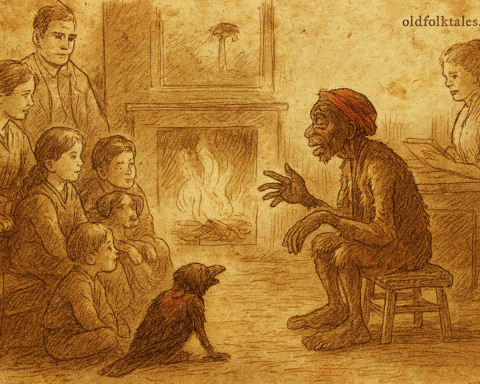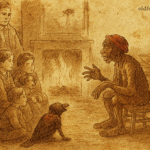Long ago, in the days when the insect world was filled with both harmony and rivalry, the ants were among the most troubled creatures. Small in size, yet countless in number, they had lived from the beginning of time under constant threat. To some, they were food. To others, they were pests. And because of this, there had been endless slaughter among them.
Most birds counted the ants as enemies, and their sharp beaks made quick work of them. Anteater, with his long tongue and tireless hunger, lived almost wholly upon their bodies. Then there was Centipede, a tireless predator, who lurked in every shadow, ready to feast whenever the chance arose. With so many foes waiting at every corner, life for the ants was harsh and filled with fear.
At last, some of the wisest among the ants said to themselves, “Shall we always remain as prey? Shall we scatter endlessly without plan? Let us hold a great council and decide how we may live in safety.”
And so, they gathered.
There was Red-ant, fierce and quick-tempered, whose sting burned like fire. Beside him was Rice-ant, lean and restless, who made his home near the harvest fields. Black-ant, solid and proud, marched with strength, while Wagtail-ant flicked his tail in impatience. Gray-ant, quiet but stubborn, stood close by, and Shining-ant, whose body gleamed in the sun, shone among them like polished stone. With them were many others of every shape, size, and nature, a great multitude gathered under one purpose.
When the council began, however, it was soon clear that their unity was only in name. Each ant had his own idea, and none would yield to the other.
One group cried, “Let us dig deep holes beneath the ground! There we may live hidden, and no robber bird or beast will reach us.”
But others shouted back, “What kind of life is that? Shall we bury ourselves forever like worms? No! Let us build a great and mighty dwelling upon the ground itself. Strong walls, narrow entrances—only an ant may pass through, and no enemy will dare approach.”
Then another party objected loudly. “If we live on the ground, what of Anteater? His nose will sniff us out, and his tongue will sweep us away like dust! Let us climb high into the trees. There we will be safe.”
But the wiser ones shook their heads. “Have you forgotten the birds? They wait among the branches and the skies. In the trees, we shall be meat for them.”
Still another group argued in whispers, “What if we had wings? Yes, wings! Then we could fly, just as birds and insects do. We would be free from the ground and all its dangers.”
The debate grew louder, voices rising above voices until the council became a true babel of noise. No one agreed. No decision was made. Discord ruled, and time passed, while their enemies prowled the land unbothered.
Far away, the Insect-king heard of their quarrel. He was a ruler who loved order, and he could not bear to see creatures waste their lives in division. With a heart of mercy, he said, “I shall send them a message. If they cannot find peace on their own, perhaps they will listen to wisdom.”
So he wrote a secret of life: the secret of unity, the message of Work-together. This was no ordinary teaching but a gift of survival. For he knew that only when the ants acted as one would they withstand their many enemies.
But fate played its trick.
The Insect-king chose Beetle as his messenger. Slow, heavy, and easily distracted, Beetle set off with the precious message. He crawled across roots, wandered into tall grass, stopped often for food, and lost his way many times. The days turned to weeks, the weeks to seasons, and still Beetle never reached the ants’ council.
The ants, meanwhile, remained the same. Divided, restless, always in quarrel, they never learned the wisdom that had been meant for them. Without the message of Work-together, they became the very picture of discord. And because of their division, their enemies never ceased to triumph. Birds swooped down upon them. Anteater’s tongue swept them in hundreds. Centipede caught them at every chance.
And so it is, even to this day, that ants, though countless in number and diligent in effort, remain easy prey because they have not yet received the message of unity.
Moral Lesson of The Lost Message
The story of The Lost Message teaches that without unity, even the strongest or most numerous community will remain vulnerable. Discord and quarrels weaken groups, while cooperation and shared purpose bring strength and survival.
Knowledge Check
What dangers did the ants face in the story of The Lost Message?
They were hunted by birds, eaten by Anteater, and attacked by Centipede whenever possible.Why did the ants gather to hold a council in The Lost Message?
They wanted to find a safe way to live and protect themselves from their many enemies.What were some of the solutions the ants suggested during the council?
They suggested living in holes underground, building strong houses on the ground, dwelling in trees, or even growing wings to fly.Who sent the message of unity in The Lost Message and why?
The Insect-king sent it because he wanted the ants to survive through unity and cooperation.What happened to the message of unity in The Lost Message?
It never reached the ants because Beetle, the messenger, was too slow and distracted.What is the main moral lesson of The Lost Message?
That without unity, communities remain weak and vulnerable, no matter how many they are.
Source: South African folktale






